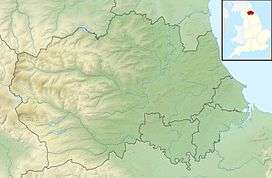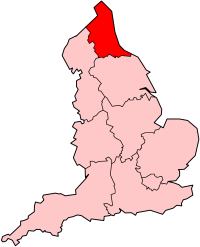Horden Colliery
| Horden Power Station | |
|---|---|
 Location of Horden Power Station in County Durham | |
| Country | England |
| Location | County Durham, North East England |
| Coordinates | 54°46′06″N 1°18′52″W / 54.768288°N 1.314526°WCoordinates: 54°46′06″N 1°18′52″W / 54.768288°N 1.314526°W |
| Commission date | 1926 |
| Decommission date | 1987 |
| Operator(s) | Durham Collieries Electric Supply Company |
| Thermal power station | |
| Primary fuel | Coal |
| grid reference NZ442417 | |
Horden Colliery was a coal mine situated in Horden, near Peterlee in County Durham.
History
It opened in 1900 and was closed on the 28 February 1987. Initially owned by Horden Collieries Ltd, it was handed oved to the National Coal Board in 1947 when the British coal industry was nationalised. On 9 May 1930, the colliery set a European record for the most coal mined by a single colliery in a day, with a total of 6,758 tonnes mined. This record stood for over thirty years. The colliery's peak employment numbers were reached in 1935 when 4,342 people were employed in the colliery.[1]
Horden power station
Horden power station was a coal-fired power station situated in the colliery. The station used a 1,000 kilowatt (kW) turbo alternator, along with four 400 kW rotary converters for DC electrical supply, giving the station a total generating capacity of 2,600 kW.[2] The station provided power for the colliery and the local homes, but has now been demolished, along with the colliery.
Red Hill
Tony Parker wrote a book about Horden and the people of Horden Colliery and anonymized it as Red Hill: A Mining Community.[3] U2 wrote a song about the book called it Red Hill Mining Town.
See also
References
- ↑ "Horden Colliery". www.dmm.org.uk. Retrieved 26 June 2011.
- ↑ "Gallery (Horden)". http://www.dmm-gallery.org.uk/. Durham Mining Museum. Retrieved 2008-12-27. External link in
|work=(help) - ↑ Alan Dein. "The Great Listener". Retrieved 22 May 2012.
